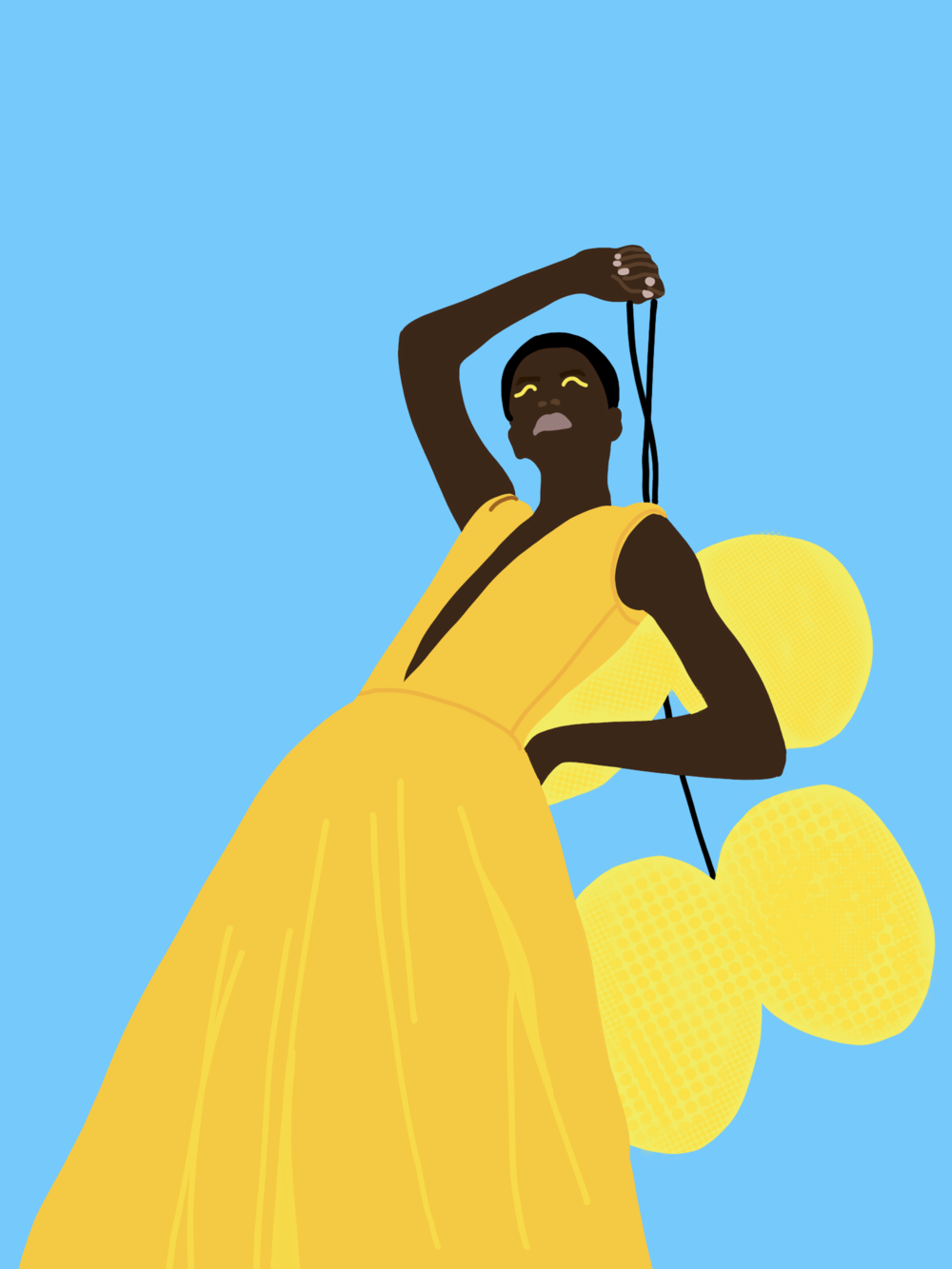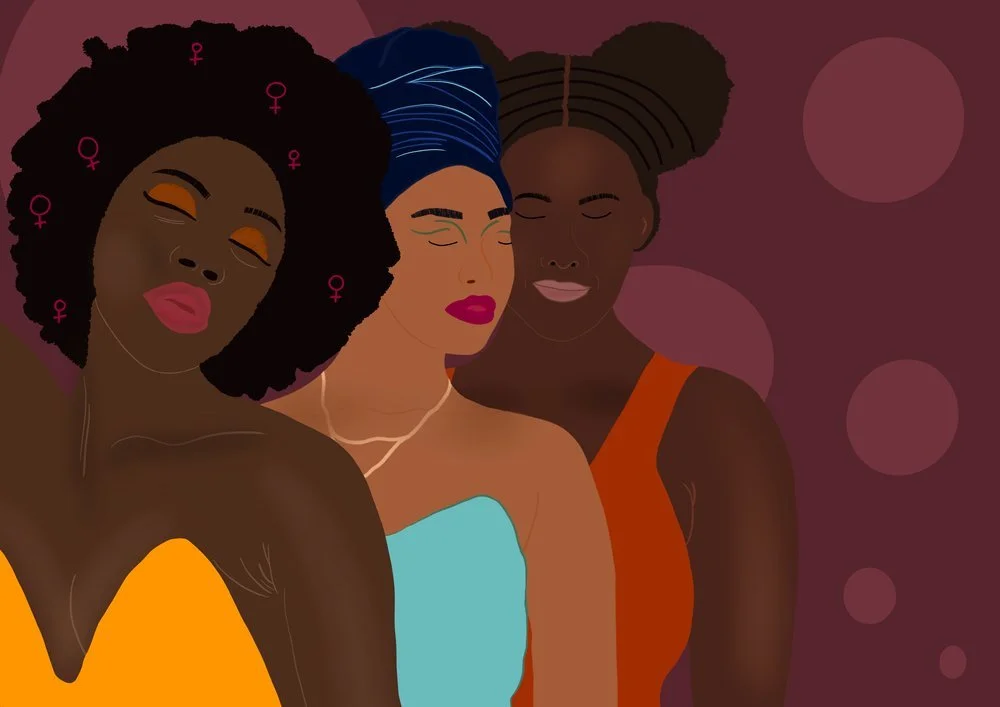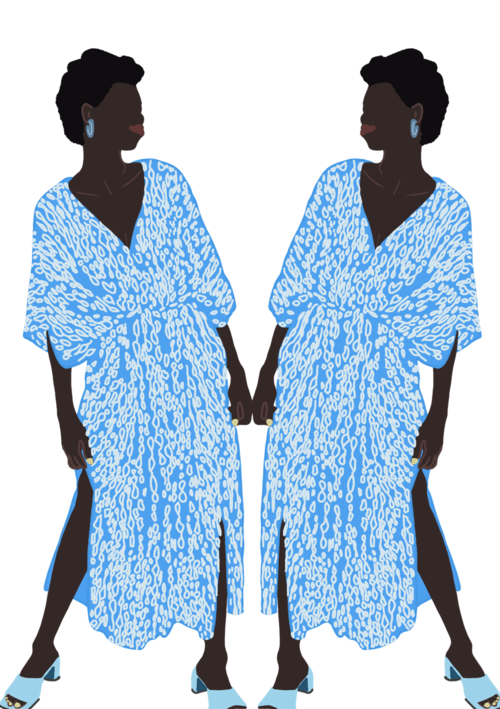Spotlight - Lucy J Turner: 'Telling Young Black Kids "Yes, You Fucking Can"... That's My Favourite Thing'
Lucy J Turner - editor of Rife Magazine, digital illustrator, activist, voted 30 under 30 influential people in Bristol… The list could go on. All of these words go some way to describing Lucy, but the word I would choose? Iconic.
To give you some sense of who we are talking about here, Lucy has worked on a whole array of incredible projects working with the likes of Watershed, Creative Youth Network, Arnolfini, Black Minds Matter UK and Rockett St George - but this repertoire is made that much more impressive by the energy she radiates. What drives her, what underpins all of this work I just mentioned, is that desire to instil a fierce sense of self belief in those who need it. Her art is a beautiful colourful language; her way to express the thoughts that go deeper than words - it is her healing, and, as importantly as that, it is her love letter to black bodies and Black women.
Punctured by dogs barking and a sprinkle of work-from-home chaos, It was as an absolute pleasure to interview Lucy - I hope you enjoy getting to know the Bristol legend that is Lucy J Turner.
So Lucy, you do so many things. You’re an editor, you’re an artist, an activist… what does your average day look like?
I don’t know if I have an average day or even an average week. I do three days at Rife and then I try and fit in freelance work when and if I can. When people say all of the stuff I do I think “Oh shit, that’s actually quite a lot” and it reminds me, that actually what I am really trying to value is rest.
How do you find striking that balance between rest and rest?
It’s something I am actively working on. I think rest is actually quite radical right now in this world. Especially for a black woman; it’s like we’re not supposed to rest. I feel like I’m juggling a lot of things but one of my priorities is to preach to people just how important rest is.
Society is not really set up for rest is it? It's always about hustle culture and being productive.
100%. So I’m feel like I’m really trying to fight against it because there was a time when we were told “hustle, hustle, hustle. You’re booked? Good. You need to be busy. You should be tired. You should be hungry.” When it’s totally backwards, so I’m doing all this unlearning. I feel that being a grown up is a lot of unlearning.
How we’re working and how we’re not living leads to burn-out, we need to slow down. I think a lot of this belief comes from the creatives I work with too. I’m part of Rising Arts Agency and they really preach rest. Rest is radical, rest is productive - and once I started thinking about that it really took on a new meaning for me.
That’s so interesting. When you say that rest is radical, what do you mean by that?
I think for me, resting is fighting against all those mainstream messages of hustle culture. It’s radical in that it is doing the complete opposite of what you are being told.
I get that. You just feel it sometimes too, don’t you? On an intuitive level. You have moments where your body is telling you to rest and you feel such guilt about it - and that guilt comes from somewhere.
So how do you incorporate that philosophy of rest into your life? Does everything you do spark joy, or do you sometimes need to push through the workload?
No, it does not spark joy all the time. I can't lie! I love everything I do, but also I'm a human and sometimes I’m tired or I don’t feel up to the task. I think rest is about knowing that we need to learn to be like okay with that, and start accepting that.
It's so interesting, I think people could look at your job and see it as the gold at the end of the rainbow. I think there's almost this idea that you get to a certain job and you will be happy every second of the day - but it’s not healthy, is it?
It's not! It kind of brings me to the whole social social media culture, because I am on social media so much for both pleasure and business. I know it’s not a new phenomenon to acknowledge that Instagram is a highlight reel. However, there’s a difference between knowing it and feeling it. So I try to be so honest on Instagram about my struggles with depression, anxiety and chronic fatigue. I want to be real.
Yes, and I love the colour stories you do on Instagram! For anyone who doesn’t know, Lucy will take a colour and then post different art or photos with that colour on it and it's such a nice corner of social media.
I’m just always attracted to colour and bright, bold images. It’s like a mini exhibition. I also only feature people of colour in those too. I love showing black creativity and black joy.
Also, I’ve grown up in a very white world; I’ve often been the only black person in the room and I’m actually adopted too. I was born in America but my whole family is white so I’ve always been in this very white environment. So I like these Instagram stories as a way of people in these white circles almost having a glimpse into my blackness and my culture that I am celebrating.
So, we’ve talked about you celebrating other people’s work, but what was your path to get to where you are today as an artist?
It’s been a real whirlwind. I’ve only been doing this properly for three years now, but basically in my mid 20’s I was diagnosed with a really rare cancer. So during treatment, I started to participate in Art Therapy sessions. There was this amazing woman, called Pam, who would wait outside the treatment centre and every time we came out of having a horrific treatment she would just be there - and it was this way to communicate when you didn’t have words. So, after that, I continued to go to Art Therapy classes and doing art for myself and I started writing little bits about my experience of having cancer.
I was also part of this group of young cancer patients that came together and we wanted to give our stories and express everything we had been through. I’d go to London once a week to meet these people. We weren’t creatives, we were young people who had cancer in common. We ended up putting this stage performance on at Battersea Arts Centre and it was one of the most incredible experiences.
I had this confidence in me and I saw an advert for Rife come up - it was a six month in-house content position and it was all about storytelling. I just thought, “Yes, I have something to say. Yes I really fucking do.” And since then I’ve just got into the habit of saying yes to opportunities - not all of them, but the ones that feel right.
That’s so amazing! So your art now is, like you said, bold and colourful. Has your style always been like that? Or is it something that's evolved?
So I only started digitally illustrating in 2020.
That's so crazy to hear!
This is why I like to tell people like it's only been a few years. You know, everyone has potential to do anything they want! But, yeah, I started illustrating in 2020 and I was always drawn to colour. I love boldness.
I started defining my style in the summer of 2020 when George Floyd was killed. I don't even know what to say - I can't put words to it. i just had so many feelings and had no idea what to do with them and so I started drawing again. My social media had become so traumatising - just sharing horrible images of black people dying. All this violence. And I just thought like, this is enough. I can't live with this anymore. So I started drawing to counter that. There's so much beauty in black people and I just wanted to create something bold and bright and beautiful - those are all the things that represent black people. So that's really when my style became more defined.
It seems that you've turned to art, initially with your cancer diagnosis and then with the murder of George Floyd, when you were facing trauma and just didn't have the words to deal with it. Do you find that your message is evolving from these points?
It’s hard to know really. I always want to champion joy and, as I always say, I love boldness and brightness, but I also think that there's a lot of mixed messaging from society that black people always have to be like one thing. We’re either traumatised or we have to be strong all the time, joyful all time, when obviously you have an array of emotions. So as much as I do want to keep continue doing bright, bold and joyful pieces, I’ve also been thinking of doing a series of black people doing mundane stuff, just boring shit. Just lying on the sofa. Regular stuff that we're not portrayed doing.
I know something you’ve also talked about is the healing aspect of art - can you tell me more about that?
I think that being open brings down other people’s walls and I see myself as a cheerleader. I also just realised that those two events (the murder of George Floyd and my cancer diagnosis), they both made me turn to art. I think I don’t always realise how much I am thinking of healing when I turn to art - but I am very open about my journey.
Also, my job as an Editor, I’m nurturing young people and a lot of young talent. I see that a lot of my job is to take care of them and draw their talent out, especially when a lot of their stories and pieces have fairly traumatic events and experiences.
I agree - I think that's the worst thing about this industry is that it kind of mines trauma in a sense, and that it really wants your trauma and wants your vulnerability but it's basically saying “be as vulnerable as you can” but we might not even reply to you, or we might just turn your trauma into a product.
I agree. It's a minefield.
So, you’ve done so much this may be difficult to answer - but what is a moment in your career that has meant the most to you?
I'm not gonna lie, I have so many moments where I just fucking love this. Especially when I’m working with young people and I see their talent and I just think YES. I get so much energy from them. It makes me smile just thinking about it now. Like, I did a talk at Fairfield High School and that was incredible. I just remember telling them, you can do anything. I'm here. I believe in you. I've got your back and if people tell you that you can't do something, tell them, yes, you fucking can.
Giving that message to children, especially young black kids... that's my favourite thing in the world. That's what I want to do. I think a lot of it is because I never had any of this growing up. I didn't really have like any black role models and I just wasn’t exposed to them. I guess I just want to do everything I can for black people; everything I do is because of black people, my ancestors.
When you were saying that everything that you do is because of black people, how does that make you feel? Is it something that feels very intentional?
Ah, good question. I really don't know if it's intentional. I think of the future a lot. I think like, one day, I'm going to have black children, so I want to make the world a bit of a better place, even if it's half a percent better. It's about community - ultimately, what would any of us be without community?
We talk a lot about the future, but where do you see yourself right now? Like if you were to talk about the Lucy that you are today?
Lucy is proud black woman one… It's interesting because I say “proud black woman” and then after that, I kind of have to think about it. But that was my immediate thing, it’s the one thing that I know I am. I am a proud black woman and I am also trying to figure it out.
And who inspires your art, and you, as you’re on this path of figuring it out?
I know I say the same thing over and over again but anyone black inspires me, especially black women. We're often just disregarded a lot of the time. So black women are genuinely my inspiration. And other black women artists especially too - like Jasmine Shanice for example. I've got so much respect for them.
Does their work energise you?
100%. There's this thing of having a shared experience. So if I walk into the room, and there's another black woman there, I already know that on some level we already get each other.
Last question Lucy - what work have you got coming up?!
Well, I can't really say because I'm under contract, which is exciting, but I can't really say anything except watch this space!
Perfect ending. Roll credits!




